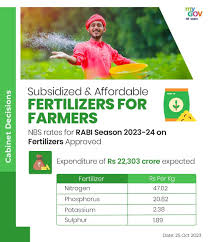Ahmedabad
(Head Office)Address : 506, 3rd EYE THREE (III), Opp. Induben Khakhrawala, Girish Cold Drink Cross Road, CG Road, Navrangpura, Ahmedabad, 380009.
Mobile : 8469231587 / 9586028957
Telephone : 079-40098991
E-mail: dics.upsc@gmail.com

Nutrient Based Subsidy
News: Recently, the union cabinet has approved Nutrient Based Subsidy (NBS) rates for the various nutrients of Rabi and Kharif Season for 2022-23.
What is NBS scheme?
• The Nutrient Based Subsidy Scheme (NBS) is a program initiated in 2010 by the Department of Fertilizers under the Ministry of Chemicals & Fertilizers.
• The scheme provides a fixed amount of subsidy on each grade of subsidized Phosphatic and Potassic (P&K) fertilizers, except for Urea, based on the nutrient content present in them.
• Main objective – i) To promote balanced use of fertilizers to enhance agricultural productivity, ii) To reduce the burden on the government exchequer, iii) To ensure reasonable prices for farmer.
• NBS policy intends to increase the consumption of P&K fertilizers so that optimum balance (N:P:K= 4:2:1) of NPK fertilization is achieved.
• Under this regime, manufacturers, importers, and marketers are allowed to fix the Maximum Retail Price (MRP) of P&K fertilizers. The MRP is determined considering various factors such as domestic and international prices of P&K fertilizers, inventory levels in the country, and exchange rates.
Benefits to Farmers:
• Balanced Fertilization: The NBS scheme encourages the balanced use of fertilizers. By providing subsidies based on nutrient content, it incentivizes farmers to use a balanced mix of nutrients, which can lead to better crop yields and soil health.
• Affordability: The subsidy provided under the NBS scheme makes fertilizers more affordable for farmers. This can help reduce the financial burden on farmers and make farming more profitable.
• Flexibility: Under the NBS scheme, manufacturers and importers are allowed to fix the Maximum Retail Price (MRP) of fertilizers. This provides flexibility and allows for the pricing of fertilizers to reflect market conditions.
Challenges:
• Diversion of Subsidised Urea: Subsidised urea is often diverted to bulk buyers/traders and nonagricultural users, including plywood and animal feed manufacturers.
• Imbalance in Fertilizer Use: Since Urea remains under price control and NBS has been implemented only in other fertilizers, farmers are now using more urea than previously because of the increased cost of other deregulated fertilizers. This leads to an imbalance in fertilizer use.
• Identification of Beneficiaries: The implementation of Direct Benefit Transfer (DBT) of fertilizer subsidy is a complex issue.
• Environmental Concerns: Schemes like NBS promote the injudicious use of fertilisers, which are the major emitters of nitrous oxide (N2O — a potent greenhouse gas and ozone-depleting substance), damaging the soil health and the fiscal health of the economy.

Address : 506, 3rd EYE THREE (III), Opp. Induben Khakhrawala, Girish Cold Drink Cross Road, CG Road, Navrangpura, Ahmedabad, 380009.
Mobile : 8469231587 / 9586028957
Telephone : 079-40098991
E-mail: dics.upsc@gmail.com
Address: A-306, The Landmark, Urjanagar-1, Opp. Spicy Street, Kudasan – Por Road, Kudasan, Gandhinagar – 382421
Mobile : 9723832444 / 9723932444
E-mail: dics.gnagar@gmail.com
Address: 2nd Floor, 9 Shivali Society, L&T Circle, opp. Ratri Bazar, Karelibaugh, Vadodara, 390018
Mobile : 9725692037 / 9725692054
E-mail: dics.vadodara@gmail.com
Address: 403, Raj Victoria, Opp. Pal Walkway, Near Galaxy Circle, Pal, Surat-394510
Mobile : 8401031583 / 8401031587
E-mail: dics.surat@gmail.com
Address: 303,305 K 158 Complex Above Magson, Sindhubhavan Road Ahmedabad-380059
Mobile : 9974751177 / 8469231587
E-mail: dicssbr@gmail.com
Address: 57/17, 2nd Floor, Old Rajinder Nagar Market, Bada Bazaar Marg, Delhi-60
Mobile : 9104830862 / 9104830865
E-mail: dics.newdelhi@gmail.com